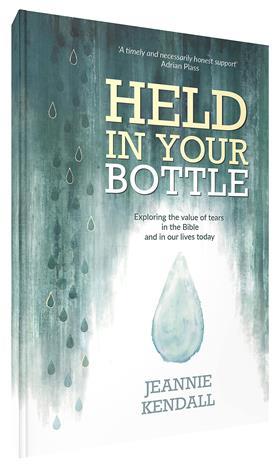There are eleven different types of tears found in the Bible, according to a new book on the theology of crying. But today’s Christians will often blot out authentic and therapeutic grief, or even avoid lament altogether. Chris Goswami believes churches need to be places where people feel able to express their emotions

It’s fascinating when someone takes a theme from the Bible, follows it through the books of the Bible and then reflects on how it impacts our modern-day lives. That is what Jeannie Kendall does in her new book, Held in Your Bottle: Exploring the value of tears in the Bible and in our lives today (Authentic Media). In it, Kendell points out that in scripture, tears flow freely and often. And it’s not just a female thing. In Genesis, Joseph holds the record of weeping the most: seven times in total. And even Jesus is not afraid to shed tears in public as he weeps over Jerusalem, at the tomb of his friend Lazarus and in the garden of Gethsemane. If it’s OK for Jesus to cry, surely it’s OK for us, too?
In the short term, our regrets tend to be for things we have done. In the longer-term, for things we did not do
Kendall’s book is an exploration of the eleven different kinds of tears that occur in the Bible. These include tears of joy, loss, parting (Naomi and Ruth) and friendship (David and Jonathan). There’s tears of anger (Jesus at the tomb of Lazarus) and tears of stress (Paul’s constant anxiety for the Church). Dramatic retellings of these stories are placed alongside modern-day true stories of people who weep.
Tears of regret
You may recall the story of Esau and his con-artist twin brother Jacob in Genesis 25 and 27. Esau is the older brother - although only by seconds - and should, according to Israelite culture, inherit the birth right assigned to the eldest brother. However one day, Esau returns from hunting, exhausted and famished, to find Jacob cooking a delicious stew. As the fragrance reaches Esau, he becomes ravenous. “Give me some of that - I’m dying of hunger,” he says to Jacob. Jacob offers him a bowl in exchange for his rights as the firstborn son. Esau, not thinking this through, agrees - and then pretty much forgets about the whole thing. However, a couple of pages later, we find Esau’s tears of deep regret as he faces his new life as the ‘second born son’.
We may find this story absurd. How foolish of Esau to trade his birth right for a bowl of soup! But as the book reminds us, we too are sometimes taken over by appetite. Many of us, for a moment of pleasure, have done things we later regret. Caught in the moment we, too, can be too impatient, hungry or aroused to stop and think through the consequences of our actions.
In the short term, our regrets tend to be for things we have done, says the author. Perhaps worrying too much about what other people might think or simply wasting time, for example. In contrast, long-term regret tends to be for things we did not do, such as missed opportunities that we feared to take, not reconciling with someone before they died or not speaking up when we had the chance to.
When is it good to not weep?
This book weaves an insightful thread through scripture and life. On the way, it raises some very practical questions. For example, at Christian funerals, do we somehow miss out on the depth of emotional experience - the need to lament - by immediately leaping to a ‘celebration of life’? Do we blot out authentic and therapeutic grief with well-meaning comments such as: “They’re with the Lord now … (let’s move on)”? Yes, they are with the Lord, says the author, but they’re not with you any longer. And it’s OK to weep over that awhile.

We live in a culture where public tears are often discouraged. But sometimes it is good to not cry, or to cry in private. For many people, the loss of dignity they feel upon weeping publically is itself painful. There can be a distinction between public and private grief, and we need to hold space for people to do what’s right for them. Churches need to be places where people feel free to cry, and free to refrain from crying. There are times when we may feel called to hold it together and manage our grief for the sake of others.
If it’s OK for Jesus to cry, surely it’s OK for us, too?
There are other intriguing questions raised by this book: did tears come into the world through the Fall? Or have they always been there? And will all tears end at the culmination of all things? Revelation 21:4 tells us that “he will wipe away every tear.” So does that mean there no tears in heaven at all? And are there tears in God?
Overall this is an honest, vulnerable and practical book that affirms the positive role that our tears play in the Bible, in life and in faith. As the author says: “one of the wonderful things about the Christian faith is that God both honours and chooses to use our humanity”. And that includes our tears.





































